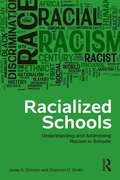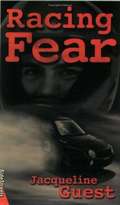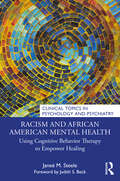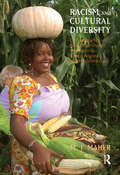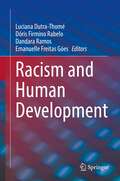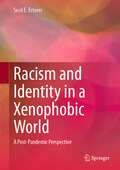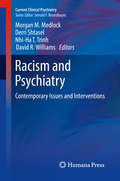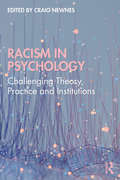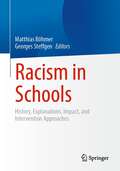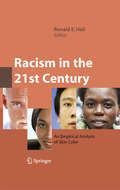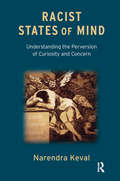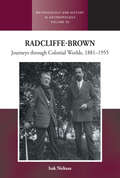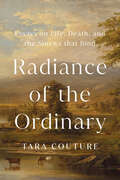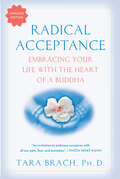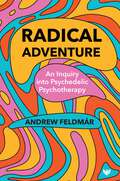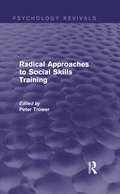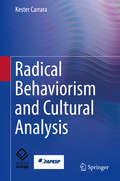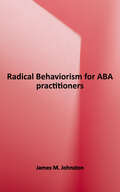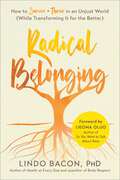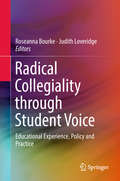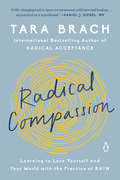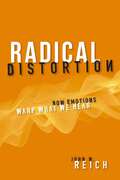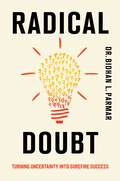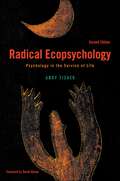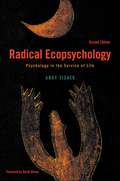- Table View
- List View
Racialized Schools: Understanding and Addressing Racism in Schools
by Shannon D. Smith Jesse A. BrinsonWhile racism continues to be a persistent and pervasive issue in our schools nationwide, the professionals charged with creating safe and nurturing educational environments have few resources available to address racism directly. Racialized Schools is on the leading edge of books that do just that and includes the latest research and praxis to help school personnel confront racism in a professional manner. A national qualitative survey of students, school counselors, teachers, and administrators sets the stage by providing readers with a 360-degree picture of today's schools and the many ways racism creeps into the lives of our students. The authors present a number of different models and perspectives on understanding and addressing racism, beginning with their own personal and professional experiences. Significant attention is also given to empowering school personnel and students to become racially aware, sensitive, and competent to address racism and racial conflicts in schools. Racialized Schools is not only a comprehensive look at racism within our schools; it is also a practical tool for use by teachers, school counselors, administrators, etc., for implementing preventative measures to combat racism directly.
Racing Fear (SideStreets #1)
by Jacqueline Guest"Racing Fear" is an action-packed ride that takes a hard look at the selling of prescription drugs.
Racism and African American Mental Health: Using Cognitive Behavior Therapy to Empower Healing (ISSN)
by Janeé M. SteeleRacism and African American Mental Health examines the psychological impacts of racism within the African American community and offers a culturally adapted model of cognitive behavior therapy for more culturally relevant case conceptualization and treatment planning with this population. Readers of this text will gain a greater understanding of how manifestations of racism contribute to the development of psychological distress among African Americans and learn specific strategies to address the negative automatic thoughts and maladaptive beliefs that develop in response to racism. Reflection questions and guided practice are incorporated throughout the text to assist readers with application of the strategies discussed in their own clinical settings.
Racism and Cultural Diversity: Cultivating Racial Harmony through Counselling, Group Analysis, and Psychotherapy
by M.J. MaherThe author writes for all those interested in the dynamics of racism, from professionals in counselling, group analysis and psychotherapy working in multiracial and multicultural societies to those exposed to racism who need help in dealing with the impact of their experiences. She also addresses the concept of victims becoming perpetrators if support is not given to contain the process. Herself a group analyst, the author experienced at first hand racial discrimination within the system, but rather than succumb has instead produced an enduring and proficient work that draws heavily on personal experience. Combining years of counselling skill with a natural compassion, she makes the subject of racism approachable, thus motivating all those wanting to explore the issues. For people whose experience of broken attachments crosses racial lines, this book is possibly the first to use Bowlby's Attachment Theory as a framework for understanding racism.
Racism and Human Development
by Luciana Dutra-Thomé Dóris Firmino Rabelo Dandara Ramos Emanuelle Freitas GóesThis book addresses the lifelong effects of racism, covering its social, psychological, family, community and health impacts. The studies brought together in this contributed volume discuss experiences of discrimination, prejudice and exclusion experienced by children, young people, adults, older adults and their families; the processes of socialization, emotional regulation and construction of ethnic-racial identities; and stress-producing events associated with racism. This volume intends to contribute to a growing international effort to develop an antiracist agenda in developmental psychology by showcasing studies developed mainly in Brazil, the country with the largest black population in the world outside of Africa. Racism as an ideology that structures social relations and attributes superiority to one race over the others have developed in different ways in different countries. As a response to the 2020 social and health crisis, some North American developmental psychologists have started promoting initiatives to openly challenge racism. This book intends to contribute to this movement by bringing together studies conducted mainly in Brazil, but also in Germany and Norway, that adopt a racially informed approach to different topics in developmental psychology. Racism and Human Development intends to be an inspiration to students, scholars and practitioners who are seeking tools and examples of studies of race and racism from a developmental perspective. The establishment of an antiracist agenda in developmental psychology will never be possible without a commitment to the study of race as an indispensable social marker of human ontogeny in any society. This book is another step towards racial equity and towards a developmental science that leaves no one behind.
Racism and Identity in a Xenophobic World: A Post-Pandemic Perspective
by Secil E. ErtorerThis book is written against the backdrop of heightened racism and xenophobia in the contemporary world. It elucidates how ‘race’ operates in racially and ethnically diverse societies and becomes a divisive force. The book offers an interdisciplinary, multi-level model for understanding the roots of racial prejudice and hatred towards the 'other' by incorporating individual, group, institutional, and societal factors. Moreover, it elaborates on the negative effects of racism on the identity and psychological well-being of individuals and proposes strategies to counteract these issues. An empirical study conducted with Asian American and Pacific Islander communities during the COVID-19 pandemic demonstrates the practical application of the theory. The significant increase in anti-Asian racism from 2020 to 2022 illustrates how easily xenophobia and racism can be triggered during times of rapid change, instability, and uncertainty. While the primary focus is on the USA, the study's findings are relevant to multiracial societies globally. This book is intended for researchers and students of interdisciplinary social sciences interested in inequality, racism, and othering, as well as those studying the Asian diaspora. It is also of wider interest to anyone, especially practitioners, seeking to understand and dismantle the problem of heightened 'othering' and racism.
Racism and Psychiatry: Formulation And Treatment In A Social Justice Era (Current Clinical Psychiatry)
by David R. Williams Morgan M. Medlock Derri Shtasel Nhi-Ha T. TrinhThis book addresses the unique sociocultural and historical systems of oppression that have alienated African-American and other racial minority patients within the mental healthcare system. This text aims to build a novel didactic curriculum addressing racism, justice, and community mental health as these issues intersect clinical practice. Unlike any other resource, this guide moves beyond an exploration of the problem of racism and its detrimental effects, to a practical, solution-oriented discussion of how to understand and approach the mental health consequences with a lens and sensitivity for contemporary justice issues. After establishing the historical context of racism within organized medicine and psychiatry, the text boldly examines contemporary issues, including clinical biases in diagnosis and treatment, addiction and incarceration, and perspectives on providing psychotherapy to racial minorities. The text concludes with chapters covering training and medical education within this sphere, approaches to supporting patients coping with racism and discrimination, and strategies for changing institutional practices in mental healthcare. Written by thought leaders in the field, Racism and Psychiatry is the only current tool for psychiatrists, psychologists, administrators, educators, medical students, social workers, and all clinicians working to treat patients dealing with issues of racism at the point of mental healthcare.
Racism in Psychology: Challenging Theory, Practice and Institutions
by Craig NewnesRacism in Psychology examines the history of racism in psychological theory, practice and institutions. The book offers critical reviews by scholars and practising therapists from the US, Africa, Asia, Aoteoroa New Zealand, Australia and Europe on racism on the couch and in the wider socio-historical context. The authors present a mixed experience of the success of efforts to counter racism in theory, institutions and organisations and differing views on the possibility of institutional change. Chapters discuss the experience of therapists, anti-Semitism, inter-sectionality and how psychological praxis is part of a colonialist project. The book will appeal to practising psychologists and counsellors, socially minded psychotherapists, social workers, sociologists and students of psychology, social studies and race relations.
Racism in Schools: History, Explanations, Impact, and Intervention Approaches
by Matthias Böhmer Georges SteffgenRacism, i.e. discrimination against people on the basis of their supposed ethnic origin, is omnipresent in schools. Apart from students, trainees and teachers, all actors in the school context are affected by this topic.Why is this so? How can racist discrimination be explained? What effects does this behavior have on those affected? And how can schools counteract it? These are all questions that arise and which this book aims to answer with the intention of enabling all those acting in the school context to critically examine their own knowledge bases relevant to racism. This book contributes to the development of school as a racism-sensitive space in which all actors behave in a racism-sensitive manner.Therefore, in addition to an overview of the history of racism, approaches to explaining racist behavior and the effects of racist discrimination, prevention and intervention approaches for a practice critical of racism in schools are presented.
Racism in the 21st Century
by Ronald E. HallIn the post-Civil Rights era, there is a temptation to assume that racism is no longer the pressing social concern in the United States that it once was. The contributors show that racism has not fallen from the forefront of American society, but is manifest in a different way. According to the authors in this volume, in 21st century, skin color has come to replace race as an important cause of discrimination. This is evidenced in the increasing usage of the term "people of color" to encompass people of a variety of racial and ethnic backgrounds. The editor has compiled a diverse group of contributors to examine racism from an interdisciplinary perspective. Contributions range from the science of racism, from its perceived biological basis at the end of the 19th century, to sociological studies its new forms in the 21st century. The result is a work that will be invaluable to understanding the challenges of confronting Racism in the 21st Century.
Racist States of Mind: Understanding the Perversion of Curiosity and Concern
by Narendra KevalRacism is a treacherous phenomenon with many faces that allow it a remarkable capacity to co-exist with support for ethnic and cultural diversity. In both its subtle and virulent forms, racist states of mind reveal a bewildering mix of anxieties, feelings and fantasies about the real complexities of life and living that a recognition of difference and diversity can potentially bring forth. In this book the author explores the quality of thinking in racist states of mind and suggests that the fantasy dramas of the primal scene provide an essential framework in which racial and racist fantasies exist as deep structures of thought and feeling. These are intrinsic to psychic life and functioning, universally present in contemporary culture as well as the consulting room where they constitute the passions of the transference. The author explores the predicaments and challenges of engaging with these states of mind in the consulting room, group, organisational, and societal life.
Radcliffe-Brown: Journeys Through Colonial Worlds, 1881-1955 (Methodology & History in Anthropology #50)
by Isak NiehausAlfred Radcliffe-Brown (1881-1955) is widely renowned as a founder of modern social anthropology. This biography challenges popular stereotypes of him as a misplaced positivist and colonial conservative. It shows Radcliffe-Brown to be a thoroughly cosmopolitan scholar, a committed fieldworker and a sharp critic of colonialism. Radcliffe-Brown engaged strategically with colonial authorities to further the interests of his discipline and invoked scientific credentials to critique central aspects of colonial rule. His struggle for intellectual autonomy and advocacy of a comparative sociological approach speaks to many contemporary concerns.
Radiance of the Ordinary: Essays on Life, Death, and the Sinews that Bind
by Tara CoutureFrom the author of the popular Slowdown Farmstead Substack: a raw, poignant collection of essays about cultivating authenticity in this age of great pretend.When she was young, Tara Couture had a deep fear of death. In her twenties, determined to manifest her long-time dream of owning a farm, she worked alongside a cattleman whose perspectives on life and death would come to transform her own. When she found herself in the passenger seat of the cattleman&’s truck out on the Alberta prairie, in search of the bison herd from which they would harvest an animal, she could hardly believe this was the life she was living. But even more surprising was the realization the experience awakened in her: that life and death are inextricably connected. When we shield ourselves from death—or from any of the hard things in life—we close ourselves off to the beauty and richness of a life fully lived.Full of evocative prose that elicits the smells, tastes, cold winds, and sticky summer sweat of Tara&’s place in the world, Radiance of the Ordinary elegantly explores the moments both complex and mundane, laden with grief and light with wonderment—from butchering and birthing cows to motherhood and the tragic loss of her youngest daughter. Throughout, the reader is reminded that the work we choose to engage with, the way we make our homes, the food we put into our bodies, the relationships we nurture, and the attention we pay to the ordinary moments—this is what matters. Taken together, these essays provide an unforgettable meditation on what it means to be alive in the twenty-first century.
Radical Acceptance: Embracing Your Life With The Heart Of A Buddha
by Tara BrachIn our current times of global crises and spiking collective anxiety, Tara Brach&’s transformative practice of Radical Acceptance offers a pathway to inner freedom and a more compassionate world. This classic work now features an insightful new introduction, an exclusive bonus chapter, and additional guided meditations. &“Radical Acceptance offers us an invitation to embrace ourselves with all our pain, fear, and anxieties, and to step lightly yet firmly on the path of understanding and compassion.&”—Thich Nhat Hanh &“Believing that something is wrong with us is a deep and tenacious suffering,&” says Tara Brach at the start of this illuminating book. This suffering emerges in crippling self-judgments and conflicts in our relationships, in addictions and perfectionism, in loneliness and overwork—all the forces that keep our lives constricted and unfulfilled. Radical Acceptance offers a path to freedom, including the day-to-day practical guidance developed over Dr. Brach&’s forty years of work with therapy clients and Buddhist students. Writing with great warmth and clarity, Tara Brach brings her teachings alive through personal stories and case histories, fresh interpretations of Buddhist tales, and guided meditations. Step by step, she shows us how we can stop being at war with ourselves and begin to live fully every precious moment of our lives.
Radical Adventure: An Inquiry into Psychedelic Psychotherapy
by Andrew FeldmarAt age twenty-seven, Andrew Feldmar accepted a tentative offer from his supervisor, Zenon Pylyshyn, a participant in the first experiments with LSD-25, to experience an LSD trip. Following that initiation, he took various other substances, always returning to LSD. During his apprenticeship with R. D. Laing, he was trained in Laing's approach to LSD-therapy. A few years later, the use of these substances was prohibited. Now, after more than forty years, research has begun again into the healing possibilities of psychedelic psychotherapy. A movement has begun to have psychedelics, entheogens, and empathogens accepted worldwide as legal. However, training in how to use them varies. Feldmar details fascinating stories of patients whose recovery hinged upon their use of LSD. He talks of how a single session of MDMA assisted many to attain insights that enabled their psychotherapy to proceed faster and deeper than before. He wants his experiences to help the next generation of psychedelic psychotherapists. They demonstrate that the most important aspect of psychedelic psychotherapy is the human connection: being involved and engaged with the other. There cannot be a protocol to follow, programmed music played, orders given. The therapist needs to feel at home within the altered state of consciousness of the patient during the session. The only way to learn this is through apprenticeship and time is running out as the older generation who worked in this way is dying out. The gains are high with this type of therapy, but so are the dangers. Thus, the focus needs to be not on the drug, but on the relationship between the therapist and the patient. Psychedelic psychotherapy is not for everyone but done well with the right patient and therapist, it can be transformative.
Radical Approaches to Social Skills Training (Psychology Revivals)
by Peter TrowerOriginally published in 1984, one of the few facts that emerged clearly in the beleaguered field of psychology and mental health at the time was the extent of poor social skills in psychiatric patients, the mentally handicapped and problem adolescents. As a result, during the 1970s, social skills training – espoused as a form of behaviour therapy – seemed to offer great promise, based on the notion that social skills, like any other skills, are learnt and can be taught if lacking. However, in evaluating social skills training, many investigators found that skills did not endure and generalise. This book attempts a major re-assessment of social skills training. It examines the underlying paradigms, which are shown to be fundamentally behaviourist. Such paradigms, it is argued, severely constrain the aims and method of current types of training. Thus the book develops what is termed an ‘agency’ approach, based on man as a social agent who actively constructs his own experiences and generates his own goal-directed behaviour on the basis of those constructs. This new model is developed in both theoretical and practical ways in the main body of the book and should, even today, be of great interest to all those involved with social skills training.
Radical Behaviorism and Cultural Analysis
by Kester CarraraThis book shows how the three-term contingency paradigm created by B.F. Skinner can be applied to describe and explain cultural practices phenomena produced by complex relations between behavior and environment. It updates the academic debate on the best paradigm to analyze complex social interactions (contingency or metacontingency), arguing that Skinner’s three-term contingency - the conceptual tool created to analyze human behavior by decomposing it in three parts: discriminative stimulus, operant response and reinforcement/punishment - is the best unit of analysis since what is selected in social interactions are not the actions of the group but of individuals gathered in a group situation to form an articulated and interlocked behavioral practice.The author argues in favor of a relational approach to study behavior and identifies its theoretical foundations in the philosophy of Ernst Mach, especially in Mach’s concept of functional relations and its influence on Skinner. Departing from this theoretical framework, the author argues that behavior can only be studied through the analysis of how it emerges from relations, and cannot be explained by hypothetical constructs such as cognitive maps, personality formation mechanisms, drives, traits and preconceived motivational forces.Radical Behaviorism and Cultural Analysis will be of interest to psychology researchers and students interested in the theoretical foundations of behavior analysis, as well as to social scientists and policy makers from other areas interested in how behavior analysis can be used to study complex social interactions and how it can be applied to build a more fair and sustainable society through cultural planning and the development of prosocial behavior.
Radical Behaviorism for ABA Practitioners
by James M. JohnstonThis edition re-titled Talking About Behavior, continues the first edition's focus on presenting students and practitioners in the field of applied behavior analysis with an engaging introduction to radical behaviorism, the philosophy underlying the field of behavior analysis. Early chapters consider some basic assumptions about the nature of behavior and clarify how we learn to talk about our own behavior and everyone else's. This foundation leads to chapters that discuss a wide range of conceptual issues in a way that shows how they are important to practitioners in their everyday work. Each chapter begins with a vignette that highlights the ways that ABA practitioners experience the misunderstandings about behavior encouraged by everyday dialect. The discussion then focuses on helping readers learn a way of talking about behavior that avoids these conceptual confusions and the problems they can cause for the delivery of behavioral services. The book approaches these topics in an informal and readable style. Pedagogical features include boxes that address special topics that supplement chapter narratives, as well as definitions of key terms and tables summarizing important points. Each chapter ends with a summary of the main points, study guides for text and box content, discussion topics and exercises, suggested readings, and supplementary website readings, which are available on this website. The book concludes with a glossary, bibliography, and indexes. Although the new edition involves the same general organization as the first edition, it includes many significant edits and improvements throughout. One of these is a list of supplementary website readings at the end of each chapter. These readings are newly edited versions of more than 50 blog posts originally published by the author, and the talkingaboutbehavior.com website has been revised to serve as an accompaniment to the text. These readings offer instructors and students opportunities to pursue aspects of each chapter that summarize chapter material, amplify certain points in chapter content, or introduce new topics related to chapter issues.
Radical Belonging: How to Survive and Thrive in an Unjust World (While Transforming it for the Better)
by Lindo Bacon"Belonging has been a formative struggle for me. Like most people with marginalized identities, my experience has taught me that it's hard to be yourself and feel like you belong in a culture that is hostile to your existence. That's why my body of work as a scientist, author, professor, speaker, and advocate for body liberation always comes back to the impact of belonging or not belonging. Radical Belonging is my manifesto, helping us heal from the individual and collective trauma of injustice and support our transition from a culture of othering to one of belonging." —Lindo Bacon Too many of us feel alienated from our bodies. This isn't your personal failing; it means that our culture is failing you. We are in the midst of a cultural moment. #MeToo. #BlackLivesMatter. #TransIsBeautiful. #AbleismExists. #EffYourBeautyStandards. Those of us who don't fit into the "mythical norm" (white, male, cisgender, able-bodied, slender, Christian, etc.)—which is to say, most of us—are demanding our basic right: To know that who we are matters. To belong. Being "othered" and the body shame it spurs is not "just" a feeling. Being erased and devalued impacts our ability to regulate our emotions, our relationships with others, our health and longevity, our finances, our ability to realize dreams, and whether we will be accepted, loved, or even safe. Radical Belonging is not a simple self-love treatise. Focusing only on self-love ignores the important fact that we have negative experiences because our culture has targeted certain bodies and people for abuse or alienation. For marginalized people, a focus on self-love can be a spoonful of sugar that makes the oppression go down. This groundbreaking book goes further, helping us to manage the challenges that stem from oppression and moving beyond self-love and into belonging. With Lindo Bacon's signature blend of science and storytelling, Radical Belonging addresses the political, sociological, psychological and biological underpinnings of your experiences, helping you understand that the alienation and pain you are experiencing is not personal, but human. The problem is in injustice, not you as an individual. So many of us feel wounded by a culture that has alienated us from our bodies and divided us from each other. Radical Belonging provides strategies to reckon with the trauma of injustice; reclaim yourself, body and soul; and rewire your nervous system to better cope within an unjust world. It also provides strategies to help us all provide refuge for one another and create a culture of equity and empathy, one that respects, includes, and benefits from all its diverse peoples. Whether you are transgender, queer, Black, Indigenous or a Person of Color, disabled, old, or fat—or your more closely resemble the "mythical norm"—Radical Belonging is your guidebook for creating a world where all bodies are valued and all of us belong—and for coping with this one, until we make that new world a reality.
Radical Collegiality through Student Voice: Educational Experience, Policy and Practice
by Roseanna Bourke Judith LoveridgeThis book celebrates the rights of the child, through including student voice in educational matters that affect them directly. It focuses on the experiences of children and young people and explores how our educational policies, practices and research endeavours enable educators to help young people tell their own stories. The respective chapters illustrate how listening to young people can help them attain new positions of power, even though doing so often creates discomfort and requires a radical change on the part of the adult establishment. Further, the book challenges researchers, teachers and practitioners to reconsider how students are involved in research and policy agendas, and to what extent radical collegiality can create fundamental and positive changes in the lives of these learners. In recent decades, greater attention has been paid across policy, practice and research discourses to involving children more meaningfully and actively in decisions about their participation in both formal and informal educational settings. The book’s goal is to illustrate how researchers have systematically involved students in the pursuit of a richer understanding of educational experiences, policy and practice through the eyes and ears of young people, and through their own cultural lens.
Radical Compassion: Learning to Love Yourself and Your World with the Practice of RAIN
by Tara BrachOne of the most beloved and trusted mindfulness teachers in America offers a lifeline for difficult times: the RAIN meditation, which awakens our courage and heartTara Brach is an in-the-trenches teacher whose work counters today's ever-increasing onslaught of news, conflict, demands, and anxieties--stresses that leave us rushing around on auto-pilot and cut off from the presence and creativity that give our lives meaning.In this heartfelt and deeply practical book, she offers an antidote: an easy-to-learn four-step meditation that quickly loosens the grip of difficult emotions and limiting beliefs. Each step in the meditation practice (Recognize, Allow, Investigate, Nurture) is brought to life by memorable stories shared by Tara and her students as they deal with feelings of overwhelm, loss, and self-aversion, with painful relationships, and past trauma--and as they discover step-by-step the sources of love, forgiveness, compassion, and deep wisdom alive within all of us.
Radical Distortion: How Emotions Warp What We Hear
by John W. ReichOur social unity is under attack from extremists on opposite sides of the political spectrum. Often the loudest and most influential public voices today are also the most divisive. Amid the din of conflicting claims, accusations, and counteraccusations, voices of moderation can no longer be heard. Radical speech is creating hazards for civil discourse and even for governance. Under such conditions, how will we ever find common ground to advance the needs of the nation? Psychologist John W. Reich presents answers to this question in this insightful discussion of the social-science research on the decision-making processes of those who endorse extremist beliefs. A key finding of this research is that extremism causes selective hearing and biases our very ability to form objective judgments. In fact, radical speech leads to radical hearing and impedes our willingness to consider moderate viewpoints. Based on these findings, Reich presents seven principles whereby we can reduce or eliminate the toxic influences of extremist rhetoric and selective hearing. These include becoming aware of how emotion affects our judgments, accepting the fact that we live in a diverse society where differing points of view are common, and detecting when extremist rhetoric is designed solely to attack its opponents. If knowledge is power, then the best antidote to toxic speech is increased scientific understanding of how our judgments are formed. By making the latest social-science research on this important subject accessible, Radical Distortion takes a crucial first step toward creating a more civil society.
Radical Doubt: Turning Uncertainty into Surefire Success
by Dr. Bidhan ParmarA revelatory, scientific approach to turning DOUBT into a decision-making superpower. Drawing on cutting-edge research from neuroscience, psychology, and moral philosophy, Radical Doubt offers a fresh perspective on decision-making, revealing why traditional approaches often fall short when facing the topic of uncertainty. Dr. Bidhan Parmar—one of the world&’s top 40 business-school professors under 40—unveils the scientific principles that prove how doubt, counterintuitively, is our greatest decision-making tool. Think back to the last difficult decision you had to make at work. Did it leave you anxious, unsure, and filled with doubt? How did you find a solution? And in the end, was your action and conclusion the best answer? Organizational leaders and managers often find themselves in such complex predicaments, where the stakes are high and clear answers are elusive. With Radical Doubt&’s comprehensive framework and multi-faceted toolkit, you&’ll learn how to tackle complex problems, treat your intuition as a hypothesis, generate multiple scenarios, craft flexible plans, and embrace doubt as a catalyst for growth. Through real-world examples and actionable strategies, leaders will feel empowered to make better decisions, balancing competing interests, using limited resources effectively, and strengthening relationships with stakeholders. This kind of decision-making is often the day's work for a corporate figurehead, and now it&’s time to move beyond the quest for the &“right answer&” and become a master of making &“better answers.&” Whether you&’re a CEO or a new project manager, Radical Doubt is your guide to navigating moments of uncertainty, transforming doubt from a source of anxiety into your superpower for strategic thinking and effective leadership. With this guide, you&’ll harness the power of doubt, unlock your potential, and lead with confidence in a dynamic and uncertain world.
Radical Ecopsychology, Second Edition: Psychology in the Service of Life (SUNY series in Radical Social and Political Theory)
by Andy FisherPersonal in its style yet radical in its vision, Radical Ecopsychology, Second Edition offers an original introduction to ecopsychology—an emerging field that ties the human mind to the natural world. In order for ecopsychology to be a force for social change, Andy Fisher insists it must become a more comprehensive and critical undertaking. Drawing masterfully from humanistic psychology, hermeneutics, phenomenology, radical ecology, nature writing, and critical theory, he develops a compelling account of how the human psyche still belongs to nature. This daring and innovative book proposes a psychology that will serve all life, providing a solid base not only for ecopsychological practice, but also for a critical theory of modern society. In this second edition, Fisher includes a new preface, a new section looking back at the development of the field since the book's initial publication a decade ago, and a look at the challenges that lie ahead.
Radical Ecopsychology: Psychology in the Service of Life (2nd Edition) (SUNY series in Radical Social and Political Theory)
by Andy FisherA provocative look at the philosophical concepts (and conceits) that underlie what truly is a radical new form of social thought.
